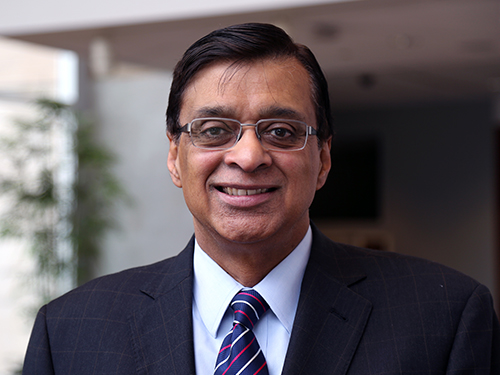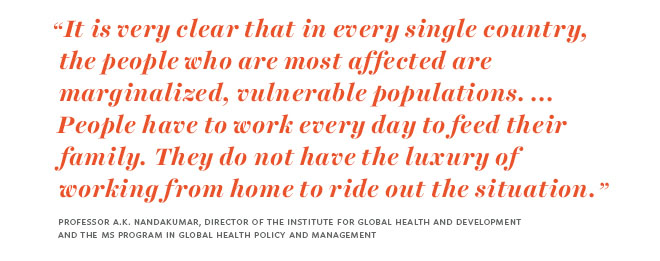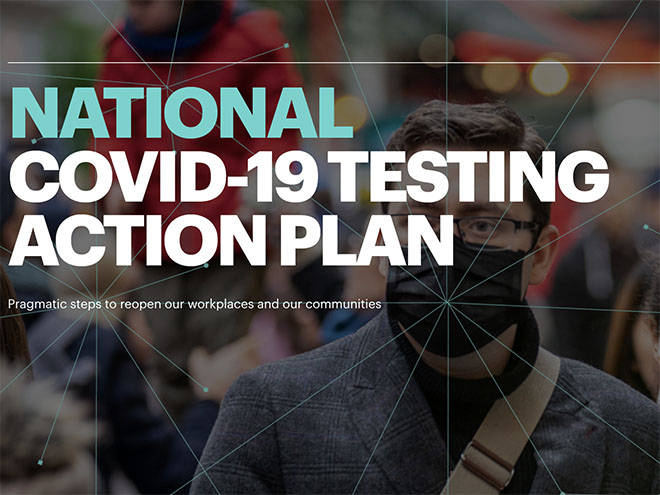
By Bethany Romano, MBA'17
As the COVID-19 pandemic evolved from a geographically contained novel coronavirus to a global crisis, health economist and global health policy expert Professor A.K. Nandakumar assumed a critical role in COVID-19 response initiatives at the national, regional and global levels.
At the U.S. Department of State, where Nandakumar serves as chief economist at the Office of the Global AIDS Coordinator, they’re adapting HIV/AIDS health care infrastructure for COVID-19 response. He’s also supported USAID India to design a blended financing facility that can identify and scale innovative solutions from the private sector. He’s helping the Rockefeller Foundation develop national testing plans, and contributed to an MIT project dubbed the “Pandemic Supermind.” That’s all in addition to his day job at the Heller School, where he directs the Institute for Global Health and Development and the MS program in Global Health Policy and Management.

Throughout these multifarious efforts, Nandakumar maintains a broad perspective of the pandemic and its economic impacts. He says, “When pandemics hit, people die in three ways. One, of course, is from the pandemic itself. The second is from health system collapse — people can’t get critical medical care for other health issues because hospitals and the primary health care system are overwhelmed. The third is from economic collapse — people lose the ability to support themselves.”
A successful strategy responds to all three dangers at once, recognizes trade-offs between each and minimizes loss of life. It’s a gigantic balancing act.
Stopping the spread
In the U.S., Nandakumar joined a group of experts helping the Rockefeller Foundation develop a nationwide testing and tracing strategy. The Rockefeller recommendations include widespread, rapid screening of asymptomatic individuals; a national campaign to encourage mask use; and significant improvements to data infrastructure and contact tracing.
“We need to scale the nationwide screening test strategy to keep essential institutions and parts of the economy open and functional until there is a vaccine or a more effective treatment,” said foundation president Dr. Rajiv Shah in a press release announcing the group’s second testing strategy, released in July.
Nandakumar says, “We seem to have enough tests overall, but they’re not deployed efficiently. We need guidance for how to test asymptomatic people in a smart, targeted way.”
When it comes to initial efforts around contact tracing, Nandakumar suggests there’s significant room for improvement. “People don’t want to pick up the call, they don’t want to give sensitive information out; there’s a lack of trust. I recommend that we borrow what we’re doing in low- and middle-income countries, where we’ve created a cadre of community health workers from within the communities themselves. We need to hire from within the community to do contact tracing.”

Strengthening health systems
In his work with the State Department, Nandakumar built a global partnership to design and implement activity-based costing and management. This system (currently used in six countries) can generate information on a routine basis to optimize investments in health systems. This is particularly important today as the pandemic strains economies in low- and middle-income countries and impacts donor spending on health.
The vast U.S. investments to strengthen health systems in many countries are paying off, he says. “Over the past 15 years, we’ve invested billions of dollars creating labs, setting up surveillance systems, promoting health insurance, setting up robust supply chains for drugs. We’re now seeing how this can be leveraged for COVID response. That’s a big positive.”
However, Nandakumar remains concerned about the virus’s disparate impact in low- and middle-income countries. He says, “It is very clear that in every single country, the people who are most affected are marginalized, vulnerable populations. In sub-Saharan Africa, the largest employment sector is informal. People have to work every day to feed their family. They do not have the luxury of working from home to ride out the situation.”
To that point, taking a sequential approach — first saving lives, then saving jobs — isn’t realistic in many of these countries. “From the outset, countries in sub-Saharan Africa have to work simultaneously on saving lives and saving jobs,” he says.

Harnessing the private sector
Harnessing the private sector and supporting businesses of every size isn’t just about saving jobs — it’s also critical to battling the pandemic itself, by producing equipment and drugs and keeping supply chains functional. “In a pandemic, you need a surge of response from the public sector and private sector,” says Nandakumar. “But the private sector needs some assurances before they can take action. They can’t go off and invest a bunch of money to develop a new testing protocol, vaccine or PPE supply chain if there won’t be demand for their products.”
On this issue, Nandakumar is experimenting with new ways to provide financing to private corporations that need capital to bring innovative coronavirus solutions to scale. He supported USAID India to develop a unique blended financing facility that matches $5 million in public funds with $100 million in private equity. This innovative idea catapulted from concept to approval by both the U.S. and Indian governments within four weeks, and already has $150 million in private equity commitments.
“This kind of blended financing vehicle can solve key market failures. It’s completely unique, and I think this is the way forward,” says Nandakumar.
Sangita Patel, director of the health office at USAID India, says, “We are grateful to Dr. Nandakumar for his excellent collaboration, critical thinking and questions, which have allowed us to plant the seeds of an idea that will certainly grow into a robust financing facility in India to mobilize resources and talent in the fight against COVID- 19, and provide learnings to other countries as well.”
Looking ahead
It’s clear that COVID-19 and its associated economic fallout will remain front and center for some time. When he was invited by the MIT Center for Collective Intelligence to participate in the Pandemic Response Supermind Activation, Nandakumar was eager to join 180 other experts for a three-week exercise intended to address long-term pandemic resilience.
“We know that a reactive stance is not good when you’re dealing with pandemics. And yet, there is no one body or group actively tracking emerging viruses and managing a pandemic preparedness plan for each country. I would love to see the U.S. government link the global health security and pandemic response offices together and put somebody in charge of coordinating that work.
“If you look back, every couple of years we encounter an unknown virus — none as bad as COVID-19 — but there’s been Ebola, SARS, MERS and so forth. We should continue to expect this going forward. And I believe we can become much better at managing it.”

